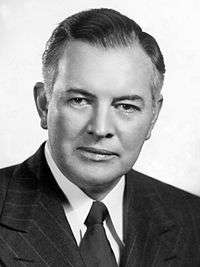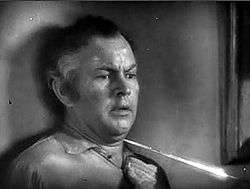Sidney Blackmer
| Sidney Blackmer | |
|---|---|
|
Promotional Photo | |
| Born |
Sidney Alderman Blackmer July 13, 1895 Salisbury, North Carolina, U.S. |
| Died |
October 6, 1973 (aged 78) New York City, New York, U.S. |
| Other names | S.A. Blackmer |
| Occupation | Actor |
| Years active | 1914–1971 |
| Spouse(s) |
Lenore Ulric (m.1928–1939; divorced) Suzanne Kaaren (m.1943–1973; his death) 2 sons |
| Awards | North Carolina Award, Fine Arts |
Sidney Alderman Blackmer (July 13, 1895 – October 6, 1973) was an American actor.
Biography
Blackmer was born and raised in Salisbury, North Carolina, the son of Clara Deroulhac (née Alderman) and Walter Steele Blackmer.[1][2] He started off in an insurance and financial business but gave up on it. While working as a builder's laborer on a new building, he saw a Pearl White serial being filmed and immediately decided to go into acting. He attended the University of North Carolina at Chapel Hill.[1] Blackmer went to New York, hoping to act on the stage. While in the city, he took jobs and extra work at various film studios at the then motion picture capital, Fort Lee, New Jersey, including a bit part in the highly popular serial, The Perils of Pauline (1914).
He made his Broadway debut in 1917, but his career was interrupted by service in the U.S. military in World War I. After the war, he returned to the theatre and, in 1929, returned to motion pictures and went on to be a major character actor in more than 120 films.
He won the 1950 Tony Award for Best Actor (Drama) for his role in the Broadway play, Come Back, Little Sheba, co-starring with Shirley Booth.
In film, Blackmer is remembered for his more than a dozen portrayals of U.S. President Theodore Roosevelt and for his memorable role as "Roman Castevet" in the Academy Award-winning 1968 Roman Polanski film about urban New York witches, Rosemary's Baby, in which he played an overly solicitous neighbor.
In 1919, Blackmer played a major role in the strike that led to the formation of Actors' Equity Association.
A humanitarian, Blackmer served as the national vice president of the United States Muscular Dystrophy Association. He also helped start up the North Carolina School of the Arts.[3][4] In 1972, he was honored with the North Carolina Award in the Fine Arts category. It is the State of North Carolina's highest civilian award. On his death in 1973, Blackmer was interred in the Chestnut Hill Cemetery in his hometown of Salisbury, North Carolina.
Personal life
Blackmer was married to actress Lenore Ulric from 1928–1939. His second wife was Suzanne Kaaren to whom he was married from 1943 to his death in 1973. He and Kaaren had two sons. They lived in the family home in Salisbury, North Carolina.
For his contribution to the motion picture industry, Sidney Blackmer has a star on the Hollywood Walk of Fame at 1625 Vine Street.
Partial filmography
|
Blackmer in the re-issue trailer for the 1934 film The Count of Monte Cristo |

- The Perils of Pauline (1914)
- A Most Immoral Lady (1929)
- Little Caesar (1931)
- The Lady Who Dared (1931)
- From Hell to Heaven (1933)
- Cocktail Hour (1933)
- "Down to Their Last Yacht" (1934)
- Transatlantic Merry-Go-Round (1934)
- The Little Colonel (1935)
- Behind the Green Lights (1935)
- False Pretenses (1935)
- The President's Mystery (1936)
- Heidi (1937) with Shirley Temple
- In Old Chicago (1937) with Alice Brady
- The Last Gangster (1937)
- Thank You, Mr. Moto (1937)
- Wife, Doctor and Nurse (1937)
- Down on the Farm (1938)
- Trade Winds (1938)
- Unmarried (1939)
- Hotel for Women (1939)
- Fast and Loose (1939)
- Teddy, the Rough Rider (1940)
- Third Finger, Left Hand (1940)
- Cheers for Miss Bishop (1941)
- Down Mexico Way (1941)
- The Panther's Claw (1942)
- Nazi Agent (1942)
- Obliging Young Lady (1942)
- In Old Oklahoma (1943)
- The Lady and the Monster (1944)
- Wilson (1944) as Josephus Daniels
- Duel in the Sun (1946)
- People Will Talk (1951)
- The San Francisco Story (1952)
- The High and the Mighty (1954)
- Beyond a Reasonable Doubt (1956)
- High Society (1956)
- Accused of Murder (1956)
- Tammy and the Bachelor (1957)
- How to Murder Your Wife (1965)
- Rosemary's Baby (1968)
Blackmer also appeared in television roles, such as "The Premature Burial" episode of TV series Thriller, 1961. He is perhaps best-remembered as Presidential candidate William Lyons Selby in the Outer Limits episode "The Hundred Days of the Dragon".
References
- 1 2 Scarvey, Katie (17 January 2010). "Blackmer a star of stage and screen". Salisbury Post. Retrieved 19 December 2011.
- ↑ http://www.findagrave.com/cgi-bin/fg.cgi?page=gr&GRid=41578120
- ↑ "Residence of W. S. Blackmer". Theo. Buerbaum's Salisbury. Rowan Public Library. Retrieved 19 December 2011.
- ↑ Scarvey, Katie (2 March 2012). "Blackmer home will likely be torn down soon". Salisbury Post.
External links
- Sidney Blackmer at the Internet Movie Database
- Sidney Blackmer at the Internet Broadway Database

- Sidney Blackmer at Find a Grave
- Sidney Blackmer at AllMovie

